#and why they’re ideologically divided
Explore tagged Tumblr posts
Text
ngl. I do think pointing to disliking solas as this massive lynchpin to weaknesses (imo) in John Epler’s writing is kind of silly.
like I think we can gesture far more convincingly to like the way Bellara’s intro writing specifically keeps undercutting dramatic tension without it really contributing to our understanding why the character Does That. Let alone if that writing choice is even appropriate when we are still trying to establish the stakes to our plot?
#I do naurrrrrt care what John Epler thinks of solas and I don’t really understand why everyone else does#oh so his solas takes feel kind of reductive? awesome I have three tumblr mutual in laws who I think the exact same of/j#who cares man. the point To Me is that even in that cut anaris writing you see like#what I would call misplaced tension relief#like all of the fourth wall breaking in that excerpt aside (because it doesn’t feature outside of cut content anyways)#by USING fourth wall breaks youre undercutting tension in one our companion’s main antagonists#if you remind us he knows he’s a character and what characters DO with both a lack of finesse and no clear goal about what that SAYS about#this dude then you are undercutting the tension building him Up as a threat#and the butt of the joke is just. the audience??? for caring????#it’s jarring and doesn’t actually help strongly establish the relationship between solas and anaris#and why they’re ideologically divided#and you CAN take the piss out of another character doing this#genuinely the sera/solas banters demonstrate this#you can have characters dislike one another and think they’re weird/strange/shortsighted etc etc#but you have to TELL us about them while doing so#by making this about THEM what it says about THEM and what they believe and judge and critique in others#and if that assessment is accurate etc etc#tunes talks critical#veilguard critical#<- kinda#and scenes like bellara going man that was weird we fought an ogre. just another Tuesday! aren’t TELLING us anything about how this#character handles stress or conflict etc because it’s not??? consistent imo???#there’s no clear follow through on why bellara acts this way here but won’t do so elsewhere imo
8 notes
·
View notes
Text
Dandy’s World Survival AU
Hey I’ve posted this on TikTok but finally also publishing this here!
Backstory
After a devastating natural disaster hitting the area, the toons are now left with ruins of what was once their home. It’s been years since the show was cancelled leaving them all but abandoned here. They’ve managed to survive for now but with this new shake up in life, it’s starting to strain on all of them. Different views and ideas on how to survive now are clashing with each other which ultimately lead to groups of similar ideologies being formed. They all know they have to venture out sometime soon… Once they do it’s the environment and stress that begins to slowly turn each toon against each other.
Heavy imagery under the cut!


Divided in sections, each of the main three groups have claimed land to keep the order and establish peace. These areas are always changing though as groups need more and more to thrive. For now it’s stable but for how much longer? No one knows.
Group 1 - Green Bandanas

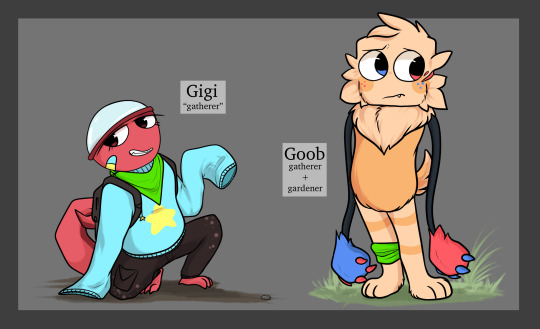
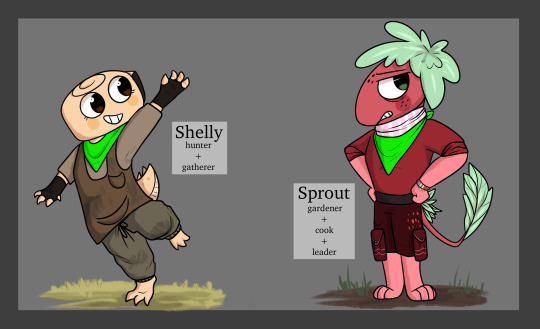
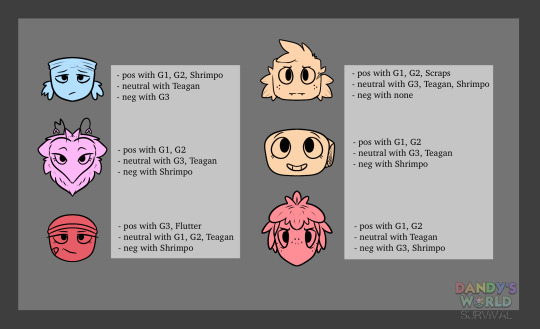
Bonded together on the idea of resources and growth, these toons decided on using whatever land they had left alongside existing resources to try and survive. They've used seeds to garden and found ways to hunt and gather. In the tall grass they learned to take advantage of and used trees to hide their base. It’s not the largest base but they're fortunate to have claimed nearby the water source. Don’t mistake their calmness for passiveness. These six sure know how to fight when needed. They’re currently hostile towards the Red Bands and alliances with the Blue Orbs. They've identified with the color green for green thumbs.
Group 2 - Blue Orbs


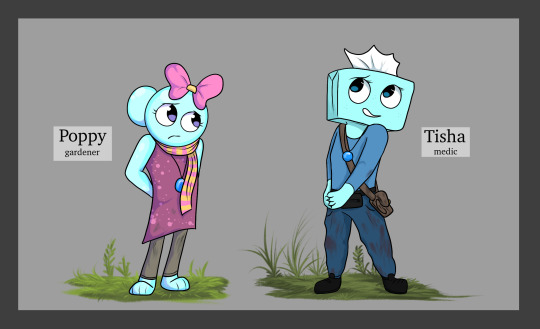
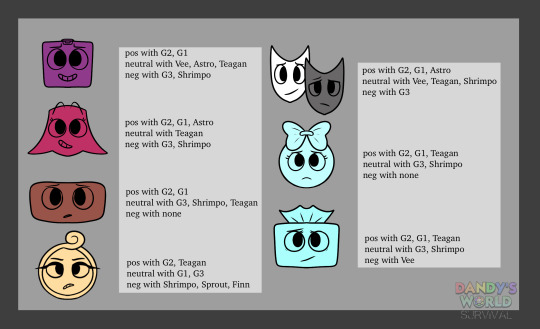
If it was fight or flight, this group chose freeze. Overwhelmed by the entire situation with a new outside world and arguments between friends, this group opted to stay together for comfort and to go with the flow. They are in close ties with the Green Bandanas. Unfortunately due to not having a solid idea on how to survive their section of land is small. They've been chased off by the Red Bands quite often. They do still have fight in them so don't think they're all whimps. They simply would prefer to not engage in a fight if it’s possible. They have a nice stable way of life, getting resources from the Green Bandanas and in return providing seeds they’ve found on their chunk of the land.
Blue is their chosen color in relation to calmness and perhaps everyone can see a blue sky once again...
Group 3 - Red Bands

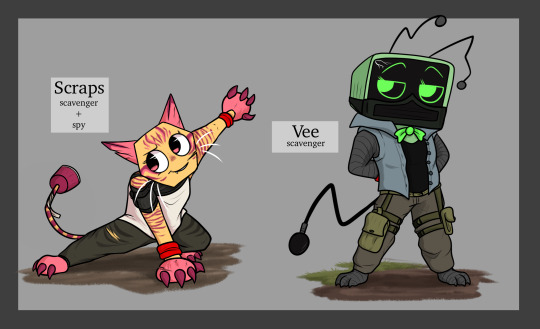
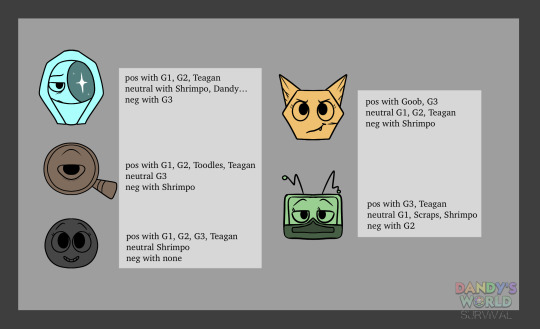
In despair and needing to feel like they could handle the situation, this group bound together on the ideas of using all means necessary to survive. While not violent, they will steal and use aggression if needed. They would prefer not to but they can cause a deadly fight. The Red Bands have a majority of the natural resources aside from food which they feel gives them an upper hand. The forest is called home to keep them sheltered so the other groups can't find them. They've chased off the Blue Orbs to gain more land and have strong tensions with the Green Bandanas.
They decided on the red color as red commonly is associated with anger. Though perhaps it's also to remind them of warmth and love deep down...
Connie + Looey


These two were added after I finished all the others so here’s their own small category.
Others
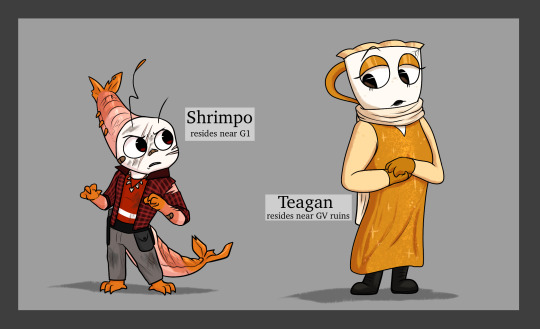
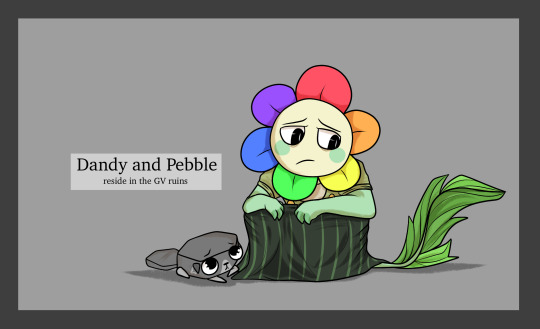
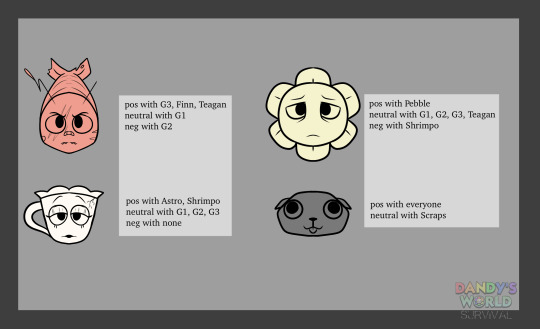
Either wanting to run their own show or stay behind, a handful of toons opted to go on their own. Whether it was though not agreeing with the current stances or unwillingness to emerge from the ruins, these toons have their own separate reasons as to why they picked to be alone. Regardless, life is harder without a community of support and they often need to venture out to both mingle and find what they need to make it through.
They are not marked by any color.
Thank you for reading I know it’s a lot! I have detailed relationship charts I’ll also post later because the simplified ones do not do any of them justice enough haha. Eventually I’ll share the comic archive I’ve already posted to tiktok here too.
#dandys world#crabs art#dandys world au#dw finn#dw flutter#dw goob#dw gigi#dw sprout#dw shelly#dw boxten#dw brightney#dw cosmo#dw glisten#dw razzle and dazzle#dw poppy#dw tisha#dw looey#dw rodger#dw toodles#dw scraps#dw astro#dw vee#dw connie#dw shrimpo#dw teagan#dw dandy#dw pebble#Oh god not again with the tags#dw survival au
32 notes
·
View notes
Text
Long Post: Why I Don’t Like The Drow
I’ve been ranting about this to a friend on discord (a lot of points I make will come from him) but I’ve finally figured out what my issue with the drow is outside of inherently evil groups being dumb.
The drow are boring. Drow lore is less of a dive into a unique culture and more of a list of fucked up things they do. Like, I cannot name a single interesting aspect of typical drow society that does not directly involve murder, sexism, or slavery, or Lolth. And even then, most of those things are written about in an incredibly bland fashion with them.
The Drow don’t really have much depth to them, and are just kind of evil for evil’s sake (or “because Lolth said so”). They do slavery, but the only real purpose of doing slavery for them is “because Lolth said so”. It isn’t for cheap labor, it’s to be more evil. They betray each other purely because that’s what evil people do. They’re misandrist, not for any real societal reason, but because Lolth hates men. There’s none of what would make slavery an interesting topic or story element, no justification for why they should be allowed to commit one of the worst injustices possible, no real economic reason for it. They just do it because Lolth says they should, and from a writing perspective it hammers home the fact that they’re evil. They aren’t evil because they enslave and murder, they enslave and murder because they’re evil, if that makes any sense.
Them being written as comically evil as they are also hurts them from a worldbuilding perspective. They’re so reliant on slaves for menial labor that the lower class of their society struggle to get jobs. Drow culture so obsessed with betrayal and dumbass house wars that even when actively under attack from the outside they sabotage each other. They’re so decadent that their buildings are held up with magic and semi regularly collapse when a spell fails. To put it bluntly, drow society feels like one that should have collapsed in a few centuries, which, funnily enough, is way longer than D&D elves live.
Their culture being so monolithic also makes writing anything about them difficult. Every drow antagonist is going to have near identical motivations, methods, and ideologies as every other drow antagonist. Every drow protagonist is going to ultimately feel very similar to Drizzt, because leaving their fucked up society to become a do-gooder is such a common backstory element that they added a whole extra god just for doing that. In fact, you can divide 90% of drow characters from any official materials into these categories:
Manservant
Ambitious male, usually a wizard (5 bucks says he has long hair and a widow’s peak)
Dommy Mommy Warcrime Woman
Drizzt Do’Urden or one of his many duplicates
Self-loathing and/or resentful Drider
And finally, their existence almost purely to be humanoid enemies you can fight at nearly any levels is just kind of lazy. This is a problem that I have with the “evil races” of a lot of fantasy but having a group that’s evil by birth just feels like an excuse to not have to write actual motivations for your antagonists. It’s the difference between “go attack this camp of soldiers because they’re part of the SkullMurder army and their general wants to use our land to build a dread fortress” vs “go attack this camp of soldiers specifically because they’re drow/goblins/orcs/the dreaded peepee-poopoo folk”. Using stuff like this just feels like an excuse to not have to write an actual antagonist since it comes pre-written in the group’s lore. This has the side effect of whenever such a group is the antagonist of the plot, the players or audience know near exactly what to expect. The orc is here to conquer, the goblin is here to steal, and the drow is here to enslave or do some dark ritual.
I’ve legitimately heard people say “well if XYZ can’t be inherently evil anymore, who will we use as bad guys?” It’s very simple: whoever the fuck we want. Write an evil queen, or a scheming wizard, or an underground slave trade network. For God’s sake, anyone can be evil, you don’t need to tie that to a specific ethnic group and write it as “they’re just like that”. Write an actual character for your antagonist.
#dnd#dnd lore#rant post#it’s also incredibly funny to me that the duergar are a near exact copy of the drow (but with dwarves)#and they somehow manage to be more interesting than the drow
133 notes
·
View notes
Text
The dinner table unites and divides, especially the question of what we eat and how we eat it. It is therefore not surprising that politicians frequently use food as a wedge issue to push their ideological agendas and define who belongs in a group and who doesn’t.
The recent political firestorm ignited by former U.S. President Donald Trump’s claim during a presidential debate that “In Springfield, they’re eating the dogs. The people that came in. They’re eating the cats,” has upended life in the small Ohio town—especially for its Haitian migrant population. The newly arrived refugees have been accused of eating their neighbors’ pets, leading to bomb threats to local schools and the suspension of in-person classes at nearby universities.
The repercussions of the event have been felt far beyond Springfield. On Sunday, vice presidential candidate J.D. Vance seemed to double down on the rumors he helped launch—telling CNN’s Dana Bash that “If I have to create stories so that the American media actually pays attention to the suffering of the American people, then that’s what I’m going to do.”
The baseless rumor Haitians immigrants eating pets in Springfield was promptly and summarily debunked by the town authorities. The soundbite was obviously meant to generate anxiety among voters who consider immigration a fundamental threat to the survival of the United States as we know it.
Whether it is truth or fiction does not matter. The Republican candidates’ divisive strategy has succeeded because of the symbolic meanings Americans—or any people—tend to attribute to certain foods that are seen to reflect and embody their identity as a community. These, in turn, generate strong emotional connections. Such reactions can easily bypass rational reflection. They feed instead off gut feelings. That’s why evidence negating Trump’s narrative may not actually change people’s knee-jerk reaction of revulsion.
The United States, due to its social and cultural diversity, is the perfect laboratory to test this kind of gastronativist messaging. Gastronativism can be activated not only via political affiliation, but also by class, religion, age, nationality, language and, of course, race and ethnicity. Throughout U.S. history, new immigrants have been accused of strange and disgusting culinary habits as a strategy to denigrate them and keep them at the margins of society.
German and Irish immigrants in the mid-19th century were identified with excessive consumption of beer and whisky, a habit that was considered with contempt in a society where anti-alcohol currents were strong and would, over time, originate legal arrangements such as prohibitionism.
The Chinese that settled on the West Coast to work in mining and in railway construction were frequently scorned for their consumption of rice as a main staple, which was considered a sign of their lack of civilization. As most of them were men, at least at first, rice was also interpreted as the explanation for their assumed lack of virility. They were also accused of eating rats, as well serving cats and dogs in their restaurants.
When new waves of migrations from Southern and Eastern Europe invested in the United States, it was the time for garlic and its smell to be derided as an inevitable trait of Italians. This time, well intentioned social workers tried their best to wean the newcomers from their excessive use of vegetables and spices and to convince them to increase their consumption of dairy and meat, which the nutritional theories of the time considered as indispensable to provide the necessary strength for those engaged in physical labor. As new populations arrived, it was their turn to see their food and culinary traditions disparaged as clear marks of their cultural and social inferiority.
The real issue, of course, was always who the “real Americans” were. And the specter of Black migrants eating pets has proved to be even more potent than old scare stories about the Chinese, Italians, and Irish.
Springfield, Ohio, has in recent years experienced a massive influx of refugees escaping political instability in Haiti. The new arrivals, who are there legally, have eased the local businesses’ need for workers, from agriculture to industrial plants. However, they have also have strained the city’s financial and welfare resources, eliciting strong reactions among locals.
While Ohio Republican Gov. Mike DeWine, acknowledging the inevitable growing pains that come with a sudden population increase, has pointed out the role of Haitians in the economic resurgence of Springfield, his fellow Republican, Vance, has ignored the migrants’ contribution to the town’s comeback in favor of spreading wild and incendiary rumors. The fact that Trump and Vance doubled down on a lie points to its usefulness in stirring apprehension among their supporters, with the goal of bringing them to the polls.
Haitian refugees have escaped a country devastated by gang violence and political disarray. Many of them are likely to have experienced food insecurity, an issue that has plagued the island of Haiti for decades and has intensified due to the recent instability. Moreover, Haitians are Black, which itself constitutes a threat for certain segments of the white electorate who feel that their way of life and their privileges are being unfairly usurped by non-white newcomers.
It is easy to project on foreigners who come from a poor country a readiness to feed themselves in any way possible, including consuming animals that better-off people would not consider food.
Haitians, in particular, are often portrayed as practitioners of voodoo, an Afro-Caribbean religion that syncretizes Catholic saints with West African deities. Born out of the culture of enslaved Africans in the New World as a form of resistance and transmission of their original culture, voodoo is connected with practices that include spiritual possession and, on occasion, animal sacrifices. American popular culture has played a central role in making these customs visible and, in many cases, terrifying—partly due to the connection between voodoo and zombie lore in films and horror literature.
The apprehension about the supposed religious practices of Haitians has deep roots in American culture. The anxiety about the mysterious habits of people of African descent has been a longstanding historical phenomenon in the United States since the colonial period. Such fears were intensified by the fact that enslaved people grew and cooked the food that their owners consumed.
Black women at times were tasked with breastfeeding white children and, in many cases, raising them. Against this background, tales about Black magic and juju abounded, indicating a clear ambivalence between the need for products and meals that came from Black hands and the awareness that those exploited in fields and kitchens may hold a grudge.
Given this history, the fake news regarding Haitians in Springfield is far from unexpected. It is through food that we distinguish “us” from “them.” And of course, “we” are inherently better than “them.”
Although Trump also mentioned wild geese being hunted, the fears about Haitian newcomers focused on pets, and in particular dogs. This particular phobia has a long lineage. Some native populations in North American did consume dog meat, causing disconcertment among European settlers. A 2018 regulation, the Dog and Cat Meat Trade Prohibition Act, was included in the Farm Bill, prohibiting the slaughtering of cats and dogs for human consumption, with the exception of native ceremonies.
Dog eating, however, was also a custom in China, South Korea, and the Philippines, among other countries, all of which have seen substantial migration toward the United States. The rapidly growing numbers of Asians in the United States intensified existing anti-Asian sentiments and racial intolerance, which increased during the coronavirus pandemic, attributed by many politicians to China. To emphasize its foreignness and blame Asians for it, Trump referred to the coronavirus as “kung flu.” The stereotype of the “dog-eating Asian” had a temporary resurgence, together with slurs and taunts that were often dug out from the past.
While dog eating is still legally practiced in some areas of China, it is in decline (Shenzhen became in 2020 the first city to outlaw it), and dog slaughtering as livestock has been banned in the Philippines since 1998, with an exception for rituals in indigenous communities and despite the persistence of some residual illegal consumption. In 2024, South Korea passed a law against the breeding and slaughter of dogs.
But reality does not seem to affect the circulation of food-related conspiracy theories, whose effectiveness is predicated on their capacity to strike emotional chords. The power of gastronativist fantasies grows precisely out of the centrality of eating in defining our identity and belonging. Facts end up losing relevance.
The incidents supposedly taking place in Springfield echo preexisting narratives with a long history, making the rumors feel familiar enough that lies begin to sound like truth. The emerging storyline of pet-eating Haitians responds to the needs of the politicians who peddle it while reflecting the ideological worldview of their followers. The victims—in this case a migrant community from a beleaguered country—are the collateral, calculated damage.
15 notes
·
View notes
Text





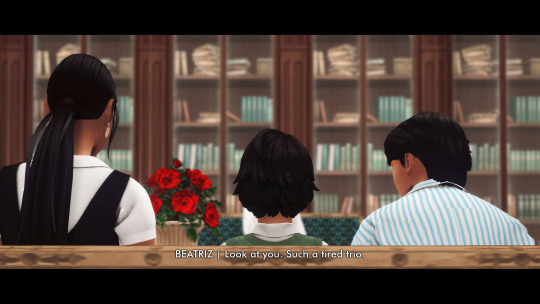
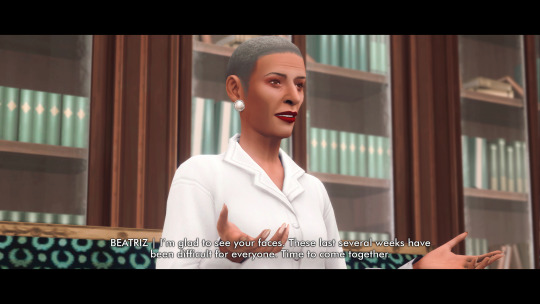
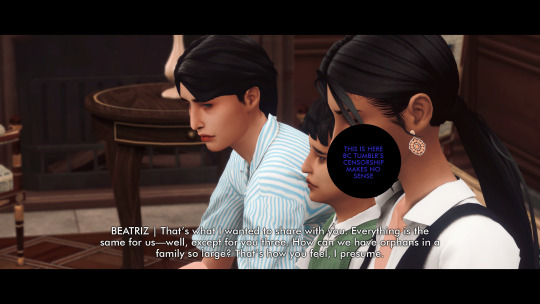


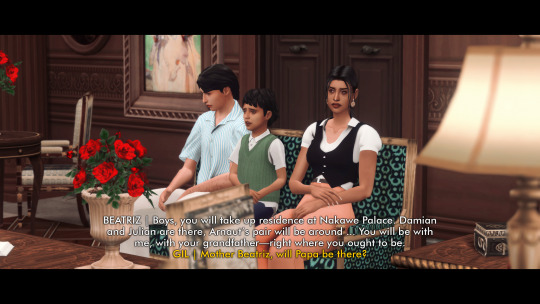
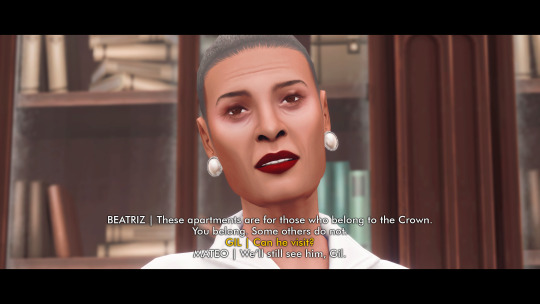

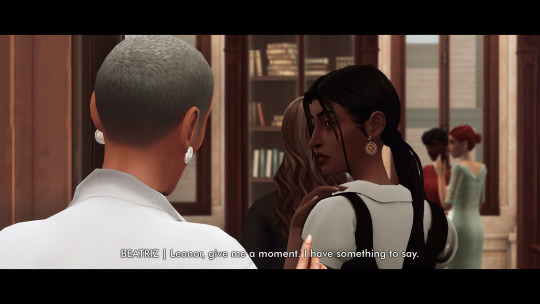





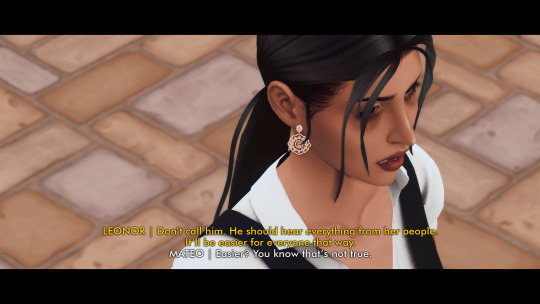
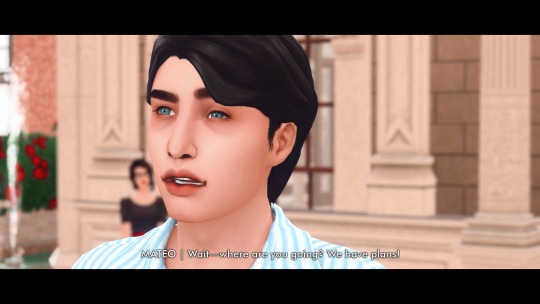
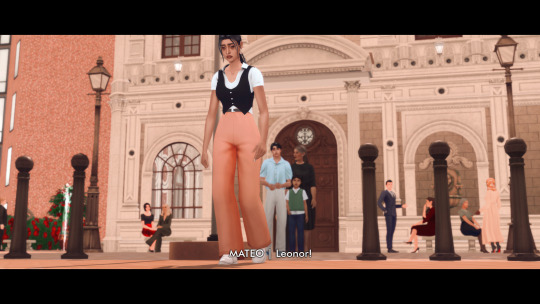
𝐍𝐎. 𝟑 ❛ 𝐝𝐨𝐥𝐥 𝐡𝐞𝐚𝐫𝐭 ❜ | QUEEN'S OFFICE, MID MARCH 1991
❧ 𝐛𝐞𝐠𝐢𝐧𝐧𝐢𝐧𝐠 / 𝐩𝐫𝐞𝐯𝐢𝐨𝐮𝐬 / 𝐧𝐞𝐱𝐭.
❛ Beatriz, like her grandmother before her, lived by the belief that Uspana was her true firstborn. When her daughter’s mourning period concluded, she returned to work on its behalf. She was not a simple figurehead. Her job was not to pose for pictures, to fundraise money for good causes, to lift the spirits of the weary with a benevolent smile. She did the work of a statesman, and she did it well. She was a politician. On any given day, her attention divided in a thousand directions—domestic versus foreign affairs, diplomacy and economics, tempestuously petty interpersonal dynamics on which national matters of life and death too often depended. Staff abounded to keep it all in order, but Beatriz had always been a hands-on executive. She knew what skeletons lurked in the closets of allies and adversaries alike, and she knew the details of bills and proposals less careful eyes overlooked. She enjoyed sparring with representatives. She harangued her ministers for sport. It wasn’t ideology that drove her so much as the desire to win. More than merely dedicated, the queen thrived in the high-stakes, head-spinning world of governance. It was one in which her weaknesses were strengths. The people of Uspana knew her reputation, but most of them credited it with the long era of stability that she seemed to have held together, almost single-handedly, through sheer force of will.
❧ TAKE TWO FUCK TUMBLR i took the screenshots for this ages ago, and !!!!! i wish that i’d had the time and energy to redo it, but :/ fine enough to just post. i wish i could say beatriz gets better, but ... idk, man, this is just who she is, which sucks sdkfshj
𝐭𝐫𝐚𝐧𝐬𝐜𝐫𝐢𝐩𝐭 ↓
TRANSCRIPT:
{Conversation}
[L] She canceled again, didn’t she?
[B] Not quite. It’s business as usual, is all. They’re taking a coffee break in a moment, so she’ll see you for a few minutes then. [L] {scoffs} Of course.
[B] Look at you. Such a tired trio.
[B] I’m glad to see your faces. These last several weeks have been difficult for everyone. Time to come together.
[B] That’s what I wanted to share with you. Everything is the same for us—well, except for you three. How can we have orphans in a family so large? That’s how you feel, I presume.
[B] You don’t know this, but he had all sorts of inquiries about Safya’s estate within mere days of … Well. Mourning is over, and there is a definitive, sweeping answer. An eviction, in fact. That was her home, and I intend to preserve it as such indefinitely.
[L] I don’t understand. What about Gil and Mateo? [B] You would understand if you let me finish, Leonor. Anyway, this is hardly your concern. You wanted to live alone.
[B] Boys, you will take up residence at Nakawe Palace. Damian and Julian are there, Arnaut’s pair will be around … You will be with me, with your grandfather—right where you ought to be. [G] Mother Beatriz, will Papa be there?
[B] These apartments are for those who belong to the Crown. You belong. Some others do not. [G] Can he visit? [M] We’ll still see him, Gil.
[B] Before you get any ideas: don’t mistake this for a discussion. I was just going to send a moving van to pick you up, but your grandfather was convinced that would be somehow cruel.
[B] Leonor, give me a moment. I have something to say.
[B] Why would you go out like this? They’ll notice. [L] Who will? [B] Come on now. The papers, obviously.
[B] You look awful. To start, go home and wash your hair. These things matter.
[B] They’re going to eat you alive. Do you hear me? They will because they can, and there’s little I can do about it. [L] {softly} They already are …
[B] Exactly. This is my one warning. Let’s not disappoint.
[M] Why didn’t you say anything? [L] Why didn’t you? [M] That’s not fair.
[L] Don’t call him. He should hear everything from her people. It’ll be easier for everyone that way.
[M] Easier? You know that’s not true.
[M] Wait—where are you going? We have plans!
[M] Leonor!
43 notes
·
View notes
Text
By: Michael Deacon
Published: Apr 3, 2024
For young people today, finding a partner of the opposite sex must be dreadfully hard. But this isn’t because of the pressure to look like an Instagram gym buff, or the horrors of dating apps, or the fact that no one under the age of 30 seems to drink alcohol any more.
It’s because these days, young men and women have got absolutely nothing in common.
Seriously. All of a sudden, they appear to have developed completely different values. It’s unprecedented. In the past, the two sexes tended to hold roughly similar views on politics. But research compiled over the past five years shows that in Britain – and indeed other Western countries – young women have become more progressive, while young men have become more conservative. And the resulting ideological gap is now staggeringly vast.
Alice Evans, an academic at King’s College London, is writing a book on this phenomenon, entitled The Great Gender Divergence. She says it’s been caused by a variety of factors, including “social media bubbles” and “economic resentment”. Whatever the reasons for it, though, I think there is a vital point we’re in danger of missing. Which is that only one of the two sexes is strictly responsible.
Recently, the Financial Times published some charts illustrating how the gulf between young men and women has grown in each Western country. And in every chart, there is an unmistakable pattern. The political views of young men haven’t actually altered all that much. Their drift to the Right has been really quite gentle.
The political views of young women, however, have changed dramatically. Their move to the Left has been abrupt and profound. In truth, then, this cavernous ideological divide is almost entirely attributable to them.
Which is curious. Because, whenever the divide is discussed by politicians and commentators, they make it sound as if the problem is young men. They fret endlessly about how young men today are being “radicalised” by nasty Right-wing YouTubers such as Andrew Tate, or horrid Right-wing politicians such as Donald Trump.
Yet they never apply this word “radicalised” to young women. Why not? I suspect it’s because these politicians and commentators tend to be progressive themselves. Therefore, they see no problem with young women becoming drastically more progressive. In their view, the more progressive someone is, the better. So the fault lies entirely with young men, for failing to emulate young women’s lurch to the Left.
Personally, though, I think this lurch Leftwards should alarm us all. The future of Western civilisation is already threatened by our collapsing birth rates. And this sudden ideological chasm between the sexes is only going to make the crisis worse. No one’s going to be forming couples at all any more, if, on every first date, the woman asks, “What do you think of Gramsci?”, and the man replies, “He’s the type of striker Man Utd are crying out for.”
It’s a chilling thought. So clearly something must be done. Politicians must spend less time obsessing over the radicalisation of young men, and start paying attention to the radicalisation of young women, instead.
As it happens, the Labour Party has announced that, when it’s in power, it will help to combat the influence that Andrew Tate has on boys. Surely it would make more sense to help combat the influence The Guardian has on girls.
Otherwise, the only way young men are going to get a girlfriend is by frantically boning up on George Monbiot and Owen Jones. And if that’s what the future has to hold, perhaps Western civilisation isn’t worth saving, after all.
[ Via: https://archive.md/WlLXk ]
==

Apparently, it's not "radicalization" when you're calling for the extermination of the Jews; so sexist and racist that you call everyone else "oppressors"; teaching kids about the objectively true mythology of metaphysical "gender" thetans; advocating for the compulsory elimination of all privately-owned property and its forcible redistribution; and/or chanting for the dismantling of society itself.
No, that's not radicalization. It's just the self-evident values of all right-thinking people.
🤷♂️🤷♀️
#radicalization#far left#far left radicals#liberal society#liberalism#liberal values#illiberalism#religion is a mental illness
14 notes
·
View notes
Text
Possibly one of the funniest yet saddest parts about all the USAmericans moving from TikTok to Little red book is the realisation that “they’re just like us”! Because I’ve seen so many people saying “they’re so sweet,” “they’re so funny” etc and it’s like yes! They’re people! And it’s just so sad to see the divide formed between people because of differing ideologies/politics because why would they be just like you?
#also us exceptionalism has become SO obvious#because TikTok isn’t/wasn’t dying#(idk if it’s still going through atp)#but yeah#tiktok#red note#little red book
2 notes
·
View notes
Text
Why We're All Human: The Power of Unity in Fandoms
Do you know why we’re human? Let me show you.
we cry and get annoyed together when Adrien keeps seeing marinette as just a friend for four whole seasons 😩, and we all hate Gabriel agreste when he decided to chase two fourteen years old in time instead of saving his damn wife 🤨. We all cried when saw marinette heart broken when she cried in her bed thinking she can never be with adrien 😭🥺. We all love plag and his smelly disgusting camamber🤢, we all love chat noir 💪 and we all hate it when they keep postponing the show all the time 😑😭. We’re more connected than we realize. We come from different backgrounds, but the art that moves us, the stories that bring us joy, are the same. We all come together to celebrate Miraculous, to find joy in the characters, the art, the struggles, and the victories. We bond over the shared love of this incredible story, and that is what makes us human.
But somehow, we’ve been taught to hate. We’ve been made to believe that disagreement means we must dehumanize each other. That if we disagree on one issue, we must abandon the humanity of the other side. I feel this divide so deeply within myself, torn between my love for my people and my empathy for those suffering. But what I’ve learned is that this is the exact kind of thinking that keeps us apart.
Hate never solves anything. It never has. Whether it was in the Holocaust, during the fight for civil rights, or now in the middle of a war, hate never brings peace. Hate never brings understanding. And when we let that hate grow, we forget who we truly are. We forget that we are all human.
You can critique Gaza and still feel sorrow for Palestinian children dying. You can critique Israel and still feel horror at what happened on October 7th. These emotions don’t need to be in conflict. Pain doesn’t cancel out empathy. We’re allowed to feel deeply for both sides. We’re allowed to feel the weight of the world on our shoulders and still hold on to the hope that we can be better.
And yet, when we get caught in the storm of conflicting emotions, we sometimes lose sight of what matters. In fandoms, we should be able to come together as humans—no matter where we come from or what we believe. Fandoms are not about rejecting each other. They’re about celebrating what unites us. Art, stories, love. These things belong to all of us. They connect us across borders, across cultures, and across ideologies.
When we dehumanize anyone—whether they’re Palestinian, Israeli, or anyone else—we lose something essential. We lose our humanity. No matter how much pain we feel or how angry we are, we cannot let hate win. We must do better. We must learn to listen, to understand, and to respect each other—even when we don’t agree.
So, let’s come together. Let’s celebrate the art, the stories, and the emotions that move us. Let’s create spaces where we can feel safe and loved, no matter where we come from or what we believe. Fandoms are for everyone. They’re for the dreamers, the thinkers, the doers, the lovers of art. They’re not about division—they’re about bringing us together in the most beautiful, human way.
To demonstrate the value of love over hate, and why hate perpetuates conflict, let’s break it down with clear, relatable examples and insights based on history, human psychology, and shared experiences:
Personal Example: Think about a time you felt truly seen or understood during a disagreement. That moment likely encouraged openness and connection. Conversely, being hated or rejected shuts us down, leaving us feeling isolated.
1. Hate Perpetuates Division, While Dialogue Builds Bridges
Historical Proof: Consider South Africa’s journey from apartheid to reconciliation. If Nelson Mandela and Desmond Tutu had chosen hate, the nation might still be embroiled in violence and division. Instead, they emphasized truth, forgiveness, and dialogue, which brought about healing and understanding.
Psychological Insight: Hate triggers defensive mechanisms in the brain, preventing empathy. When people feel attacked, they become more entrenched in their views, making constructive conversations almost impossible.
2. Hate Amplifies Suffering
Hate often leads to cycles of revenge, prolonging misery for everyone involved. Look at long-standing global conflicts; the unwillingness to let go of hate has resulted in generations growing up amidst pain, without seeing a resolution.
Example: In the Israeli-Palestinian conflict, hate and dehumanization prevent people on both sides from seeing each other as individuals with shared pain, hopes, and fears. This perpetuates the conflict rather than resolving it.
3. Love and Empathy Heal
Research-Based Evidence: Studies in neuroscience reveal that acts of empathy and kindness activate the brain’s reward system, leading to positive feelings and stronger social bonds. Empathy also fosters understanding, which is the foundation for conflict resolution.
4. The Power of “I See You”
Hate tells people: “You are less than.” Love says: “I see your pain, and I respect it.” This acknowledgment can be transformative.
5. Hate Prevents Growth, While Love Fosters Resilience
Hate consumes energy that could be used for constructive solutions. Meanwhile, love and respect create safe spaces for people to grow, innovate, and resolve challenges together.
Let’s add the inspiring example of Rudy Rochman and strengthen the case for choosing love and dialogue over hate:
---
6. Love Has the Power to Dissolve Even Deep Hatred
A Real Example of Dialogue Over Division: Rudy Rochman, an Israeli activist, has shown how love and respect can melt even the deepest hatred. In his conversations with pro-Palestinian individuals—some of whom openly expressed hostility toward Israel—he chose to approach them with understanding and genuine curiosity. Despite the sharp differences in beliefs, these discussions ended in hugs.
- Why This Matters: The act of listening, acknowledging the pain of others, and maintaining respect demonstrates that human connection can transcend even the most entrenched divisions. Rochman’s approach illustrates that people are more likely to respond to love and understanding than to hostility and hate.
7. A Hug Can Say More Than Words
- At the end of these discussions, hugs symbolized something profound: We may not agree, but we see each other as human. That simple gesture bridged gaps that seemed insurmountable. This is a testament to how choosing empathy and respect can build connections, even in the most contentious of circumstances.
---
Conclusion: Hate Shuts the Door, Love Opens It
Would you rather perpetuate a cycle of pain, or take the first step toward understanding, healing, and reconciliation? When we stop dehumanizing one another and start talking with open hearts, we can move from division to connection.
The evidence is clear: hate blinds us to the humanity in others, while love has the power to unite even those who seem irreconcilable. Like Rudy Rochman’s example shows, all it takes is a willingness to see the other person as human and engage in honest, respectful dialogue. It’s not about agreeing on everything—it’s about agreeing to disagree with love, not hate.
This is the real power of humanity: choosing to listen, choosing to see, and ultimately, choosing to care.
The Question to Reflect On:
Would you rather be stuck in an endless cycle of hurt and hate, or would you choose a path where, even in disagreement, you are met with understanding, compassion, and respect?
By choosing love and dialogue, we create an environment where healing and solutions are possible. It’s not about erasing differences or pretending conflicts don’t exist—it’s about humanizing each other and recognizing that, in the end, we all seek the same things: peace, safety, and acceptance.
#miraculous ladybug#miraculous#adrien agreste#ladybug#ladybug and chat noir#ml fanart#israel#palistine#pro palestine#pro israel#miraculous fandom#mlb fandom
2 notes
·
View notes
Text
I didn’t think there could ever be hate in my heart until I saw Trump’s ad campaign against trans people. It was like how is it even possible for the “liberal media” to fabricate something like that? The man is legitimately the worst kind of person you could ever encounter. No news program biased towards a political party could make that up so those excuses would never work with me. Divide and conquer in general will not work with me because I know what to look for. I know all the tricks of that age-old war tactic and I’m too I’m educated on the subject. I think what they look for is people that aren’t to be able to use all this propaganda and have it work.
I don’t care about the political party wars. Trump is legitimately a horrible human being and that’s enough of a reason to go against him. And the fact that I’m not an American doesn’t make a difference to me either.
I’m sure a lot of people think that way. The “It’s not happening here so why should I care about it?”
Nope. That doesn’t work with me either. There’s no way to deter me from doing whatever is in my limited power to make sure this horrible man doesn’t achieve his goal.
It’s not the way I’ve been brought up. And by that - I mean Xena and Dragon Ball Z and other forms of art/entertainment that have been very formative and inspirational in my life for me to have the values I have.
I’ve been brought up to be in service to the greater good and fight like fuck for everything I care about.
So don’t try it. It won’t work. I’m the wrong target.
I think the fact I’m not an American has helped with that because I’m not forced to choose a side. It’s on my own volition. I saw that there was a necessity for me to step in and make my voice known and I’ve chosen to.
To some that makes me a mad woman because involving myself in what’s “not my business” is a foolish thing to do to them. And okay, yeah. I get that. But it presents no immediate danger to my life or anyone else I love and I know that it won’t so I don’t think it’s mad.
They ask me “Why?”, I answer with “Why not?”
Because as far as I see it, … if it has more of a chance to help someone else that needs it than it has any chance of hurting me, I’d say that the “madness” is worth it.
So I’m a “mad woman”. I’ve been called worse. I’ll live.
See what I mean? There’s nothing you can say.
Nothing. You can’t stop me, so just stop trying.
I’ve made up my mind and it’s not going to change. That man with the horrific mindset that he has cannot be allowed to have any power over an entire country.
His thought process scares me. He has the mindset of a dictator. Somebody who wants to rule through tyranny.
It’s enough for me to act. It’s enough for me to try.
What comes out of that man’s mouth is how he thinks, what he believes and what he intends. No matter how clever the media is these days, they cannot fabricate something like that. It’s not possible. And that’s all that matters to me. Nothing else is involved in why I do this. I don’t care about political ideology or wars. I don’t care about the fact I’m not an American. I don’t care about anything other than that vile man needs to be stopped.
So I will keep using my voice. I will keep putting my efforts everywhere they’re needed. I won’t stop. And if that makes me a “mad woman” so be it. It’s my choice.
What I’ve been taught growing up is what has lived in me all my life. It continues to influence everything I do or say. I would be an entirely different person otherwise.
I’d be a person that today, as I am, I’d be disgusted by. Interactions in my life have made a huge difference to it. So how could I ever think or believe I wouldn’t ever be able to do the same for someone else? It’s not in me. And I can tell you if enough people believe the same, then there’s absolutely a chance to change the game.
Solid belief. Solid intention. Solid conviction.
There’s not a single force in the world that can break it. And when enough people are unified in that philosophy, then victory is always possible no matter what the odds.
“Causes are only lost when people give up.” - Xena.
That man is targeting people that are my family by solidarity and choice if not by blood or relation and I won’t let him harm them. That’s my solemn promise.
You attack the LGBTQIA+ community, then you attack me personally. That’s the way I look at it. End of rant.
2 notes
·
View notes
Text
Why Don't We Learn From Our History?
by Michele Sommerstein
Why don't we learn from our history?
These books, composed by the victor teaching children, cold stats, facts and rhymes repeat after me: in 1492 Columbus sailed the ocean blue. The end. repeating Never calling it invasion, genocide, theft, what it really is Oh, but so quick to call out other countries, when they do the same Quick to blame and closing the curtain on our own messes imperialism! presented as heroic And so, we never learned
Politicians gaining power by feeding the great divide “This group is why, you’re not getting all you deserve these people are why it’s hard” Why don’t the masses ever catch on? See the pattern? This history of scapegoating? ‘Cus we’ve seen this all before, the scapegoat du jour while the same politicians take more and more
Why do they not teach this?
Why don’t we know that there is plenty to go around? That it’s the wealthy powers that be, so quick to point the finger that take the most?
Why don’t we see them, feasting, laughing at us, nearly choking, on their excess tax free, as we fight each other for crumbs? Shaming the poor, for needing help, in a system that keeps them poor As they hand out even more corporate welfare galore to the already wealthy, finding money for war while cutting social services, ‘cus you know, “there isn’t enough funds.”
And they tell us, our worth is something we. must. earn. That our worth is something we can buy (can you afford it?) (that lawn, that house, that car) That our worth is theirs to decide determined by class, race, gender, sex and productivity ability and ability to make money Only then are you of “value” to them (while remaining disposable) That our worth is something they can take away So you better comply and behave, conform for if you don’t, it will only "justify" your oppression Calling you less than when we are all. born. of worth.
Pitting us against each other as if there was a nationwide shortage as if there was not enough rights to go around, they keep us down Saying maybe you can get your rights, but it’ll be on the backs of this group As if we all can’t be free as if someone must always be oppressed
This, that has happened all before and repeating but they never taught this in those books, and so we never learned
And the politicians, who swear they are not extremists while subtly normalizing white supremacist rhetoric with their dog whistles with their anti-immigrant lies Sure, they’re not outright calling for a white ethnostate, per se but… they also don’t want too many brown people here either Why don’t we see the connection? Why don’t we see them, delicately dancing like a foul preacher or snake oil salesman on the borders of this ideology?
Japanese internment camps who? Eugenics what?
Consequences, connections! Why do we not learn from our history?
Perhaps they only teach us what they want us to know… Perhaps, they only teach us, what they want us, to know. For when we grow, rise up, evolve it is a threat to the status quo, So keep it watered down Don’t encourage thinking Just memorize the stats & spew it out on test day A+… and repeat.
#poetry#poem#disabled poet#eugenics#christopher columbus#japanese internment#history#history repeating itself#education#school#history class#thinking#poems on tumblr#activism#political poem
2 notes
·
View notes
Text
Nobody Practices What They Preach
6/8/23
A couple of years after my Exit, I remember having a brief conversation with my mom where I mentioned my disappointment at the behavior of some local pastor who was caught up in a scandal and had to leave their church. I mentioned that christians always talk about how good and well-behaved and holy they are, but then you find out it was all a lie.
My mom replied, in a very patient and tolerant tone of voice, "christians sin too. We are human, just like everybody else."
And that was it. As if that answer was enough: "christians sin too."
But the problem is, christians don't talk like they're "just people." They say they've been “chosen by god.” They say they're right. They say they Know, with a capital K, what is right and wrong.
"In the world but not of it," they proclaim, which is just code for "We're better than you. We are heaven bound. Whatever happens here on earth is meaningless in the grand scheme of eternity. But you non-christians? You are sinful. Earthly. Bound for hell. And we don't associate with the hell bound."
They've drawn a line in the sand. Us vs them. Me vs you.
It's worse when you look at christian leadership. I watched the Hulu documentary about Jerry Falwell Jr. the other day, and the one about Hillsong the weekend before that. I was a little disappointed when I finished. I thought these tell-alls were going to be shocking. Eye-opening. Mind-blowing.
But the reveals were not particularly surprising.
Doesn't everyone know pastors abuse children? And have sexual dalliances outside their marriage? And are willing to engage in all sorts of unethical behaviors to "further the will of god," whatever they decide that to mean?
I mean, it's great to have proof. And yes, please, hold predators and criminals accountable, destroy their reputations and lives, and take away the power they wield. Whether or not they're christian. I'm a fan of all that.
But I also know that when you eliminate one predator, there will always be another to take their place.
I was around 8 years old when the pastor of my childhood church got booted for having an affair. I remember it distinctly.
"What is happening?" I asked my mom. Everyone at church was in a hubbub that morning.
"Pastor Hall got caught holding hands with a lady who wasn't his wife," my mom told me.
I didn't see why that was such a big deal at the time, of course. Holding hands wasn't that bad, was it? But apparently this time, it had been catastrophic. It divided the church. People left. We left.
I imagined Pastor Hall at a coffee shop, innocently holding hands with some kind woman while eating a snack. I spent many years quite confused about the whole thing. I was much older before I realized what had actually happened.
Then, the youth pastor in the same church got booted for getting a divorce. Then a pastor at nearby church got kicked for having "a big ego" which most certainly was a cover story for something else. This is all in a 10-mile radius in a rural part of upstate New York. At churches I attended in some capacity. That my friends went to.
Naturally, I grew up intensely distrustful of pastors, especially male pastors, and anyone in a leadership position in church. Not because I personally experienced any specific abuse, but because I knew that any of them could be a snake.
They even preached it! "A wolf in sheep's clothing" could be anywhere. Anyone. Even one of them.
After all, "christians sin too."
This particular idea sparks a very specific rage in me. "christians sin too," isn't just some one-off thing my mom said. According to most protestant ideologies, it's a foundational component. Everybody is a sinner. But! jesus' blood covers all sins. If you sin, even after being born again, all you have to do is repent and you will be forgiven. You should strive for perfection, of course, but if you don't attain it, no worries. Repentance to the rescue! Even the catholics have a framework for it: confess and do penance. Then some magic happens... and you're cleansed!
It's a free pass to be a hypocrite.
You can a.) become a christian, b.) not follow christianity at all, and c.) still get to heaven by merely repenting!
Even in the last moments of your life, if you repent with your very last breath... saved!
No accountability necessary. No amends necessary. Doesn't matter how much harm you've caused to other people. Doesn't matter if you've murdered or raped or exploited people. It doesn't matter the nature, frequency, or intensity of the crimes you've committed.
There's a single, easy out: simply ask god for forgiveness.
Even Hitler could be in heaven if he repented before he died. Even genocide is covered by the blood of jesus.
This basic, foundational element of the christian ideology turns out to be a convenient loophole not only for committing grievous offenses against other people, but for consolidating and maintaining power and money as well.
How else would a guy like trump get the support of evangelical christians? He's one of the least christian-behaving people on the fucking planet! He's had too many wives, has sex scandals galore, committed pretty much every sin in the book, is a jackass of epic proportions—and not to mention, you know what the bible says about rich guys? Easier for a camel to get through the eye of a needle than for a rich guy to get to heaven.
But when you're christian, it's easy to overlook that stuff. You know why? Because you don't have to believe that he's a good guy. You don't have to believe that he's never fucked up. You don't have to believe that he's holy, moral, or the epitome of a righteous man.
All you have to believe is that he has repented. That's it.
And if he messes up again? Easy. He just has to repent again. He's sorry for harassing women. He's sorry for mocking disabled people. He's sorry for stealing classified documents, trying to subvert democracy, and inciting an insurrection. After all, god forgives everybody, you know. No exceptions.
Now imagine you're on the board of directors at a megachurch. You discover that one of your leaders had committed [insert grievous sin here]. Does he express repentance? Maybe even shed a few tears? Then you're golden. As god forgave him, so can you. You pray for him, instruct him not to fuck up again, and sweep the scandal under the rug, everyone outside this small group none the wiser.
Because, as you know, "christians sin too. They're only human, after all."
The thing is, nobody practices what they preach perfectly. It doesn't matter if we're talking about christians or buddhists, social justice warriors or school administrators. There's a reason parents and teachers like to toss around the aphorism, "Do what I say, not what I do." Because they know they're never going to behave perfectly in line with whatever ideology they espouse.
And that's okay. We are all human. We're complex. Nuanced. And there are a million variables that impact our behavior—it's rarely as simple as a black and white, right/wrong choice. Sometimes it's impossible to know what the right choice is. Sometimes mental illness, trauma, society, cultural norms, confusion, brainwashing, and who knows what else influence us to make spur of the moment decisions that are harmful and go against what we profess to believe. Sometimes, it's as simple as our actions had a different outcome than intended.
Ultimately, being a "good person" is not about being perfect.
It's about taking responsibility for our choices. That's it.
And the christian ideology conveniently removes that. They don't have to take responsibility, because they've been cleansed—freed from sin!—by the blood of christ! hallelujah! (/sarcasm). All they have to do is repent. Quietly. In private.
Redemption Unlocked.
What about the people they've harmed? you might wonder. Like me?
Well, there's a convenient answer for victims too: Repent of your wicked ways, and jesus will lift your burden from you! He will heal your trauma (caused at the hand of another one of his followers, of course)! Fix your problems! And if he doesn't? Clearly you didn't repent good enough. It's your fault. When you're holy enough, god will bless you.
And the circle goes round. The abusers, manipulators, and predators harm and repent, harm and repent, confident they'll end up at the pearly gates when they die. They don't give a shit about their victims, because they know all the victim has to do is pray, and whatever pain or damage they experienced will be lifted, healed, repaired by the all loving, all knowing god who watches from on high.
Nobody practices what they preach. Especially christians.
#exvangelical#ex christian#ex fundamentalist#ex religious#ex evangelical#indoctrination#christian loopholes#christianity#christianity sucks#redemption#redemption is a lie#accountability#repentance#practice what you preach#agnostic#absurdist#atheist#atheism#antichristianity#father forgive me for I have sinned#sin#wolf in sheeps clothing#rage#exvangelical rage
15 notes
·
View notes
Note
Harry has peace’d out on saying anything to fans on social. He will never call anyone out. Not if his life depended on it. Last thing he or his team even commented on was spit gate. He thinks he’s the royal family - never complain never explain. He won’t venture onto social media anytime in the near future because he doesn’t want to face the backlash that people would give him - not that he would see it anyway. He’s too insulated now. He doesn’t care if his fans fight it out on social as long as they keep buying his music and tickets to his shows. Doesn’t care that people are literally laughing at the TR farce and the fact that the media licks his boots every time he shows his face. Why would he? TPWK Harry is long gone from our world and we as fans need to accept the Harry-shaped hologram we get now and Do I sound bitter?
Hey anon! Thanks for the message!
Yes you do sound bitter, but I can understand the frustration and know exactly where it’s coming from. Your feelings are valid.
The important thing I would like you to take away from this is that Harry’s team have advised him not to say anything that would risk him losing popularity. It’s exactly why all big artists don’t speak up about political issues 99% of the time (except this is a much smaller issue that should be addressed before more fans start leaving) and it’s because if they’re just seen as a pretty little celebrity that doesn’t say anything, then they’re not upsetting anyone. Managers and PR teams advise this all the time. Don’t cause any rifts, don’t divide your fandom, don’t cause a stir by saying something you believe in. It just is what it is. Say nothing, so people can believe what they think you believe in, and don’t have to see the truth and disagree with you. His team have always had this ideology, and the fan divide is no exception.
Stay quiet, pretty, straight, and politically neutral so you can keep all your fans no matter what they believe in. It’s a mistake they made by addressing Larry, and they don’t wanna do it again. It prompts interview questions, articles, and media that can affect Harry’s career. I can assure you that his silence is because he’s frustrated and his team don’t want him to say anything.
I fully can understand that me saying “his team is doing this, his team is doing that etc.” can be frustrating because he should have more control over what he wants to say and share with his fans, but i say it because it truly is the case. And yes, we can hold him accountable to fight this nonsense, but a lot of it isn’t his decision, and a lot of it he has been taught to believe.
“If you say you’re gay, you’re gonna lose fans who are homophobic”, “if you say you’re gay, you’re unattainable to your straight fans”, “if you tell the fans to settle and TPWK, they’re gonna think you’re saying they’re bad fans and cause more drama”, “if you speak up for what you believe in, those who disagree with you won’t support you, and your career will be in jeopardy” etc.
Anyway, yeah. He’s a good guy, just stuck in a tricky spot right now. But, as I said before, something’s gotta give. And it’s gonna end explosively.
5 notes
·
View notes
Text
Last week, the first papers from a collaboration between Meta's Facebook and a team of external researchers studying the 2020 election were finally published. Two of these studies asked: Are we trapped in filter bubbles, and are they tearing us apart? The results suggest that filter bubbles are at least somewhat real, but countering them algorithmically doesn’t seem to bring us any closer together.
Some are interpreting these results as proof that Facebook divides us. Others are claiming these experiments are a vindication of social media. It’s neither.
The first study tried to figure out whether we’re really in informational echo chambers, and if so, why. Unsurprisingly, the segregation in our information diets starts with who we follow. This mirrors offline life, where most people’s in-person social networks are highly segregated.
But what we actually see in our Feed is more politically homogeneous than what is posted by those we follow, suggesting that the Feed algorithm really does amplify the ideological leanings of our social networks.
There are even larger partisan differences in what we engage with, and Facebook, like pretty much every platform, tries to give people more of what they click, like, comment on, or share. In this case, it looks like the algorithm is sort of meeting human behavior halfway. The difference in our information diets is partly due to what we’ve chosen, and partly the result of using computers to guess—often correctly—what buttons we’ll click.
This raises the question of how ideologically similar people’s news should be. You can read the computed values of the “isolation index” in the paper, but it’s not clear what numbers we should be aiming for. Also, this study is strictly concerned with “news and civic content.” This might be democratically important, but it makes up only a few percent of impressions on Facebook. It’s possible that positive interactions with people who are politically different change us the most, even if it’s just reading their posts on unrelated topics.
The second study directly tested whether increasing the political diversity of people and publishers in your feed has an effect on polarization. For about 20,000 consenting participants, researchers reduced the amount of content from like-minded sources by about a third. This increased consumption from both neutral and cross-cutting sources, because the amount of time spent on Facebook didn’t change.
Of the eight polarization variables measured—including affective polarization, extreme ideological views, and respect for election norms—none changed in a statistically significant way. This is pretty good evidence against the most straightforward version of the “algorithmic filter bubbles cause polarization” thesis.
But this is not the end of the story, because filter bubbles aren’t the only way of thinking about the relationship between media, algorithms, and democracy. A review of hundreds of studies has found a positive correlation between general “digital media” use and polarization, worldwide, as well as a positive correlation with political knowledge and participation. Social media use has many effects, both good and bad, and filter bubbles aren’t the only way of thinking about the relationship between media, algorithms, and democracy. For example, there’s evidence that engagement-based algorithms amplify divisive content, and tools to reach targeted audiences can also be used for propaganda or harassment.
We need to ask not just how to prevent harm, but what part platforms should play in helping to make societal conflicts healthier. It’s a deep question, and scholars have explored how different theories of democracy might call for different types of recommender algorithms. We don’t want to eliminate all political conflict or enforce conformity, but there’s no denying that the way Americans are fighting each other now, sometimes called pernicious polarization, is destructive, escalatory, and unhealthy.
Meta’s results notwithstanding, we know that content can have effects on polarization—because of the Strengthening Democracy Challenge, a series of experiments that tried to change how people approach political conflict. It’s also possible to algorithmically identify political content that garners agreement across societal divides, a strategy known as bridging-based ranking, and prioritizing such content is thought to reduce polarization. Such a ranking system is already in use to select Twitter’s community notes. There have even been experiments showing that a carefully designed AI chatbot can help mediate divisive conversations.
There is, in short, a lot to try.
Many people will be looking to the current batch of experiments to either crucify or exonerate Facebook. That’s not what they do; this is bigger than Facebook, and these studies are early results in a new field. Meta should be commended for undertaking open research on these significant topics. Yet this is the culmination of work announced three years ago. In the face of layoffs and criticism, the appetite for open science on hard questions may be waning across the industry. I’m aware of at least one large research project Meta recently canceled, and the company said it “does not have plans to allow” another wave of election research in 2024. Many in the research community support a bill called PATA, which would give the National Science Foundation authority to vet and prioritize research projects which platforms would be obligated to support.
Simultaneously, the AI era is dawning, and our information ecosystem is about to get a lot weirder. We’re going to need a lot more open science on the frontiers of media, machines, and conflict.
4 notes
·
View notes
Text
Rare (Part II): The Lab-Grown Revolution
Let’s take this conversation up a notch because it’s not just about how meat is cooked (or undercooked, if we’re being honest). No, this is bigger—existential, even. It’s about the fundamental stupidity of resisting progress when science has handed us the golden ticket to ethical, sustainable, and technologically perfect meat. Yes, I’m talking about lab-grown meat, the one thing that should unite meat-eaters and non-meat-eaters alike, but somehow manages to attract opposition from every corner of the culinary and ideological spectrum.

Meat Eaters: Primitive Loyalty to Tradition
Let me start by addressing my fellow omnivores. I’m a meat-eater. I’m human, and like most of humanity, I’ve inherited an evolutionary predisposition to enjoy the taste, texture, and smell of cooked meat. It’s primal, it’s ingrained, and I make no apologies for it. But here’s where I draw the line: when meat-eaters cling to the idea of killing animals as though it’s some sacred rite of passage. As if stabbing a cow and carving it into steaks is essential to our identity as humans.
Newsflash: it’s not. You don’t need to worship the blood and guts of traditional meat production to be a meat-eater. If lab-grown meat tastes the same, feels the same, cooks the same, and is molecularly identical to what we’ve been eating for millennia—without killing a single sentient being—why wouldn’t you jump at the opportunity? Oh, right, because “ooga booga, real meat come from real animal.” Congratulations, you’ve just made a cannibal look rational.
Vegans and Vegetarians: A House Divided
Now, let’s talk about the other side of the aisle. There’s a subset of vegans and vegetarians who get it—who see lab-grown meat for what it is: the ultimate compromise, a way to enjoy the sensory experience of meat without the moral or ethical baggage. But then there’s the other subset: the purists, the moral absolutists who oppose lab-grown meat on the grounds that it “still perpetuates the idea of eating animals.”
Let me break this down for you: lab-grown meat isn’t an animal. It’s meat without the suffering, the factory farms, or the environmental devastation. It’s the answer to your prayers, but because it still looks and tastes like the thing you’ve sworn off, you can’t handle it. That’s not morality; that’s dogma. You’ve turned your ideology into a prison, and now you’re standing in the way of the single greatest leap forward for animal welfare.
Capitalists and Industry: Stagnation for Profit
And then there’s the meat industry itself—a bloated, lumbering dinosaur that refuses to evolve. These are the same people who’ll tell you lab-grown meat isn’t “real” while pumping traditional meat full of hormones, antibiotics, and God-knows-what else. They’ve built their empires on the backs of industrial-scale slaughter, and they’re terrified of a future where they can’t profit off mass suffering.
Let’s be real: the technology for lab-grown meat is here. It’s been here. But the meat industry doesn’t want to adopt it because it threatens their bottom line. Transitioning to lab-grown meat would require rethinking supply chains, retooling factories, and—heaven forbid—investing in innovation. Instead, they pump millions into lobbying campaigns to convince the public that lab-grown meat is unnatural, unsafe, or unappetizing.
The Anti-Tech Luddites
Of course, no discussion about lab-grown meat would be complete without mentioning the anti-science crowd. These are the same people who think vaccines are a conspiracy, 5G causes brain cancer, and lab-grown meat is somehow “unnatural.” Never mind that traditional meat production is the most unnatural thing imaginable—an assembly line of death designed to maximize efficiency at the expense of ethics, sustainability, and basic decency.
Lab-grown meat is the culmination of human ingenuity, a way to mimic nature while transcending its flaws. But these Luddites would rather cling to their superstition and pseudoscience than embrace a solution that benefits everyone.
The Cannibal Analogy
Here’s the analogy that sums it all up: Imagine a society of cannibals. You offer them lab-grown human meat—identical in every way to the real thing, but made without harming a single human being. Any rational cannibal would jump at the opportunity. But no, these hypothetical cannibals would rather keep eating their siblings, chanting “real meat taste better” while wiping Aunt Linda’s blood off their chins.
Sound absurd? That’s exactly where we are with traditional meat production. We have the technology to produce perfect, cruelty-free meat, but instead, we stick with the old ways because they’re familiar. It’s embarrassing.
Transcendence Through Technology
I might be biased as a transcendentalist, but I believe humanity’s purpose is to embrace technology that allows us to evolve beyond our primal instincts. Lab-grown meat isn’t just a scientific breakthrough; it’s a moral imperative. It’s a way to enjoy the best parts of being human—our love of food, flavor, and culinary creativity—while leaving behind the worst parts: our cruelty, wastefulness, and ignorance.
Call to Action: Demand Better
We need to demand better—not just from the industries and governments that control our food supply, but from ourselves. It’s our collective mindset that fuels this stagnation. Every time we accept traditional meat as the default, every time we shrug and say “it’s just the way things are,” we’re complicit in our own backwardness.
It’s time to call out these mentalities. The meat purists, the anti-science cultists, the capitalist traditionalists—they’re all obstacles to progress. And if we don’t battle them with reason, logic, and, yes, forceful advocacy when necessary, we’ll continue to be the most willfully primitive species in the universe. An embarrassment to any advanced species out there, and to our future selves.
Final Word: Eat Meat, Advocate for Lab-Grown
Eat meat if you want to. Enjoy it, savor it, celebrate it. But don’t settle for the old ways. Demand lab-grown meat. Advocate for it. Push for a future where we can have our steak and eat it too—without the blood, the suffering, or the shame. If we can’t do that, then we deserve every bit of mockery and scorn any intelligent alien species would heap upon us. And frankly, we’d deserve it.
#rare meat#culinary laziness#food industry#ethics#lab-grown meat#sustainability#tradition#evolution#pseudoscience#innovation#technology#progress#science#future#omnivore#vegetarian#vegan#compromise#factory farming#animal welfare#capitalism#industrialization#advocacy
0 notes
Note
Every multiple of 5 of the ask game you reblogged, for any character/s of your choosing! — @coarsely
@coarsely thanks for the ask! (also i am tickled by this way of deciding on questions to ask) putting these under the cut
5. Can they cry on command? If so, what do they think about to make it happen?
i think that pre-canon bai hua could probably cry on command (i have vague concepts of her working a customer service job on the side while in school) but currently no, her body can't fake emotions very well
10. What fact do they excitedly tell everyone about at every opportunity?
a hui (who hasn't been shown up yet) loves talking about snake venom. to be fair, she is a snake in human form (most of the time) so this is probably the most classic thing that she could talk about but she truly loves suggesting venom to every possible problem
15. What’s the most obvious difference between their behavior at home, at work, at school, with friends, and when they’re alone?
bai hua doesn't actually have a job in the novel (unless you count trying not to die as a job) so the divide is more pre-canon/canon era. pre-canon, she's a tired graduate student struggling under a lot of stress, and she's fairly withdrawn and keeps to herself, but canon-era she purposely interacts with people a lot more
20. Who do they like as a person but hate their work? Vice versa, whose work do they like but don’t like the person?
pre-canon bai hua had a lot of umbrage with various academics who she liked perfectly fine as people. on the other hand, she respected her advisor's work a lot but could not stand the woman
25. What subject / topic do they know a lot about that’s completely useless to the direct plot?
literally anything bai hua studied pre-canon because she didn't study history or popular literature
30. When they make a mistake and feel bad, does the guilt differ when it’s personal versus when it’s professional?
for songjing: they're sort of opposites on this! song yan feels much more guilty about personal things than professional things; on the other hand, jing ya feels much more guilty about professional things than personal things (this has a lot to do with the fact that they're a daoist priestess and a sect heir respectively—song yan is more focused on interpersonal relationships, while jing ya necessarily is usually thinking about things in terms of social relations and professional etiquette)
35. What is the smallest, morally questionable choice they’ve made?
songjing's assumption that bai hua didn't need to eat anything (to be fair it makes sense in the context! but bai hua had no idea this was why they were doing it and was just pissed off they weren't sharing food with her)
40. How do they respond to a loose handshake? What goes through their head?
amusingly enough even though it'll never be relevant in the plot bai hua would be incredibly annoyed by a loose handshake, she would think it's a sign of the person's uncertainty and lack of self-confidence
45. What’s something unimportant / frivolous that they hate passionately?
a hui hates birds with a passion. this comes off as incredibly unimportant to most people because what's a bird done to you? but she remembers all too well being a regular snake and being terrorised by birds.
50. What belief / moral / personality trait do they stand by that you (mun) personally don’t agree with?
bai hua is motivated in large part by filial piety towards her master and as someone who grew up entrenched in a culture of filial piety while it makes a great motive for a character, i cannot stand the ideology irl
55. What’s something they’re expected to enjoy based on their hobbies / profession that they actually dislike / hate?
bai hua hasn't been in a fight yet but as soon as she does all her "wow having a sword would be so cool" is going to evaporate into "i don't ever want to fight again this sucks" which. i mean. she's an immortal cultivated sword everyone assumes she's into fighting.
1 note
·
View note
Text
They Want You Divided.
This is the truth: powerful forces profit from our division. They’re not just banking on it—they’re fueling it. They thrive when you’re angry at your neighbor. They smile when you see the “other side” as your enemy. Why? Because as long as we’re fighting each other, we’re not fighting them.
The billionaires, the corporations, the lobbyists—they don’t care about left or right. They care about power. They care about control. And keeping us divided is their greatest weapon. Every lie they spread, every social media post designed to enrage, every pundit screaming nonsense on TV—it’s all part of the plan.
But here’s what they fear: us waking up.
When we stop shouting and start listening. When we remember that most of us, left or right, want the same things. Decent wages. Safe communities. A future for our kids. When we look past the noise and see each other as people, not labels.
The truth is, cooperation scares them more than anything. Unity dismantles their game. And we’ve done it before. History is full of movements where ordinary people, across ideologies, came together to demand change. Civil rights. Workers’ rights. Women’s suffrage. None of it happened because people stayed in their corners.
So don’t fall for the trap. Don’t let their lies poison your hope. Hold onto it fiercely, because hope is power. And hope, when combined with action, is unstoppable.
We are stronger together, and they know it. That’s why they fear us. That’s why they divide us. Let’s prove them wrong.
0 notes